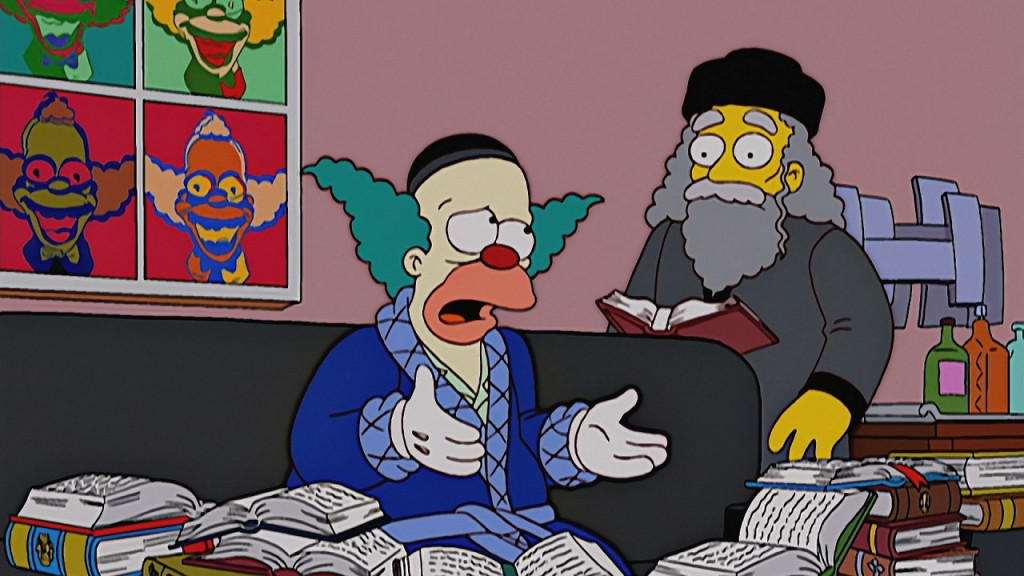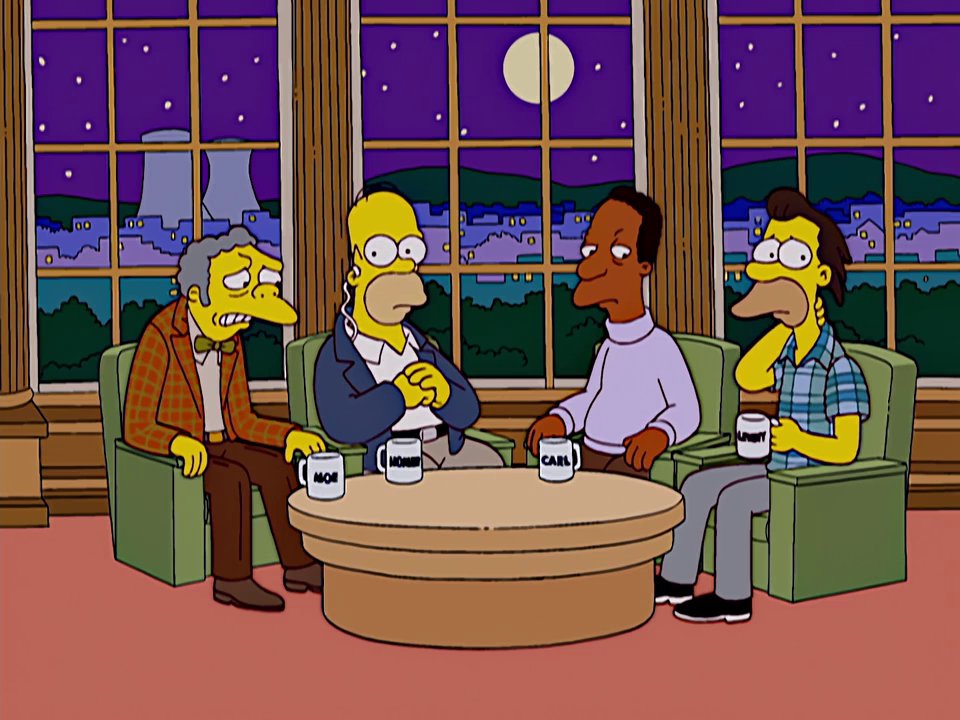One of the many distinctive things about The Simpsons is that religion is a big part of its characters’ lives. The eponymous family is full of grousing but nevertheless consistent church-goers. Lisa wrestled with the Eighth Commandment. Homer chatted with the big man himself about life, the universe, and everything. Ned Flanders questioned his own usually unfailing devotion and, for better or worse, Apu’s Hindu beliefs have been a major element of his persona. Even Reverend Lovejoy has faced down his own growing apathy and waning commitment to his flock.
And, of course, the show features the world’s most famous Jewish clown. As I discussed on The Simpsons Show Podcast, Krusty (real name: Herschel Shmoikel Pinchas Yerucham Krustofsky) is an odd place to look for representation if you are, like yours truly, Jewish. He is venal, crude, and shameless. And while there’s occasionally good cause to sympathize with him, there’s rarely a reason to truly admire the guy as a symbol of Semitic humor or charm.
Despite that, the series’s stealthily religious bent allows him to be, well, religious in a way that few other Jewish characters on television were at the time. Sure, Willow from Buffy the Vampire Slayer and Ross and Monica Gellar from Friends were nominally members of the tribe, but that rarely, if ever, intersected with their day-to-day lives in a way that was meaningful or recognizable.
Krusty, on the other hand, has been notably and distinctively Jewish since “Like Father, Like Clown” explored his upbringing back in season 3. He’s not sui generis in that regard and, thankfully, Jewish people are no strangers to the entertainment industry, which pays dividends for representation. But despite his many foibles, Krusty’s faith was allowed to be a major part of who he is on The Simpsons in a way that’s quietly remarkable.
That’s a big part of why I like “Today I Am a Klown.” The episode features Krusty in a state of mental and spiritual malaise, until he finds purpose within the rediscovery of his faith. He decides to finally have a bar mitzvah, the coming-of-age ceremony where a Jewish boy becomes a man and accepts his responsibilities within the faith.
It’s a great excuse for The Simpsons to delve deeper into the character and earn some Hebrew haw-hahs in the process. The episode plays the jokes about Judaism to the hilt. It channels the paternal embrace and tsuris that emerge between Krusty and his father. And it depicts our favorite green-haired goon finding unexpected solace and fulfillment in his Jewish heritage and, against all odds, even some moral fortitude.
Granted, the episode still suffers from the usual problems that afflicted The Simpsons in its fifteenth season. “Today I Am a Klown” wastes much of its opening act on pointless flights of fancy involving Maggie trapped in the bathroom and Homer taking Santa’s Little Helper out for a night on the town. It crams in a harried B-plot about Homer’s rapid-fire rise and fall from grace as a T.V. roundtable host. And it also leaves parts of Krusty’s story undercooked thanks to the valuable minutes squandered elsewhere.
But the episode is also surprisingly sincere and, most notably, funny. Admittedly, the Jewish humor here isn’t particularly deep. You don’t have to have spent years at the yeshiva to make puns like “I can’t shmear you,” or to have Itchy declare “Mouse-el Tov”, or bring in Mr. T to “pity the shul…that won’t let Krusty in now.” Still, these types of jokes are chuckle-worthy at worst, and much of the episode’s raft of amusing sign gags and plays on words keep the Semitic smiles flowing.
What’s more, the show does manage to wring some more well-observed humor from Krusty’s awakening and recommitment to Judaism. The gags about how little he knows about his own faith — mistaking Chaim Potok for a Klingon and mispronouncing “kosher” — both serve to highlight Krusty’s preexisting disconnect from his roots and win a few yuks from the ridiculous depths of his lack of knowledge.
Krusty may punctuate a characteristically gruesome episode of Itchy & Scratchy set at a bris with a declaration of “That’s what I believe now!” — highlighting the amusing combination of enthusiasm and ignorance in a recent convert. Even his sad self-recrimination: “I thought I was a self-hating Jew, but it turns out I’m just a plain old anti-Semite,” is both a solid dramatization of Krusty’s spiritual blues while also working as a nice play on cultural tropes.
Aside from the structural flaws and unnecessary fluff, the episode only truly falters when it gets away from that side of Krusty’s story and briefly turns into a half-baked satire of network programming circa 2003. There’s a worthwhile point, and even some solid humor, to be wrung from Krusty’s show being replaced by a low-stakes, Homer-led gabfest. The concept of T.V.-watchers wanting pointless debates over unimportant marginalia, rocketing shows that deliver it to the top of the ratings, only to turn away in droves when those same yak-boxers actually raise something of substance, is a solid one.
The problem’s that “Today I Am a Klown” starts, glancingly explores, and winds up that tale in no more than four minutes, leaving it threadbare and unable to convey any real commentary or comedy in all that rush. The subplot manages to provide Krusty a reason to stake his comeback but doesn’t accomplish much, if anything, beyond that.
By the same token, the show eventually pivots to tweaking reality television in Krusty’s half of the episode, with the clown aiming to retake the spotlight by producing a star-studded, sparkler-heavy version of his bar mitzvah produced for a T.V. audience. Somewhere in that stretch, there’s a decent observation about the shallowest indulgences of the idiot box, especially on The Simpsons’s home network. Unfortunately, the episode’s satirical matzah ball soup here is made with rather thin broth.
Still, despite the deliberate absurdity of a televised religious ceremony co-hosted by Mr. T, “Today I Am a Klown” laudably connects Krusty’s flashy Judaism-adjacent stunt with his actual growth as a character and a person. When Krusty’s denied his place on the Jewish Walk of Fame due to his lack of a bar mitzvah, Lisa rightfully wonders how the son of a rabbi could have missed that landmark event in a young Jewish boy’s life. Rabbi Krustofsky explains that he was afraid his son would make a mockery of the whole service, a worry justified by Krusty making a mockery of that very moment.
So when Krusty turns the culmination of his re-enlightenment into yet another shallow T.V. spectacle, it’s his father’s worst fears realized. After all of the good work after Krusty’s reawakening, all of his commendable efforts to learn about and embrace his faith, he’s turned it into just one more shallow show business display.
That is, until Krusty sees his father shaking his head in the audience and remembers why he chose to do this in the first place. The “Raymond rerun” levels of success of Krusty’s televised bar mitzvah earn him his show back, but in that moment, he realizes he’s more interested in earning his father’s respect.
The episode closes with Krusty living up to his promise to have a real bar mitzvah in a temple, showing how the clown of the hour can balance his camera-ready goofball side with his newfound reverence. The looks of joy and appreciation in his and his father’s eyes complete the character’s journey here, telling a familiar story of Jewish catharsis and, as has been documented so famously in much Hebrew art and entertainment, of reveling in the value of these traditions.
Despite the sweetness of that ending, there’s nothing so revolutionary in “Today I Am a Klown.” The episode delves amusingly, but not particularly deeply, into Krusty’s reinvigorated faith. Its jokes are roundly funny, but not especially incisive (give or take the bris gag). Even Krusty regaining his father’s acceptance and blessing here is a minor redress of the events from Rabbi Krustofsky’s debut.
But there’s something warm and joyous about the show’s most significant Jewish character taking center stage in an episode built around the journey to rediscover his religion and culture. When we meet Krusty here, he is a spiritually listless and unfulfilled schmuck, bored with life and mixing champagne and slimfast to pass the time. When we leave him, he’s found some sort of peace in his acceptance of his faith and the smiling approval of his devout dad.
In between those two points, there’s a lot of fluff, a lot of wheel-spinning, and a lot of schmaltz. But there’s also a recognizable tale of a Jewish adult reconciling his modern life with the hallowed traditions of his ancient ancestors, and just enough quality Hebrew-heavy yuks to grease the wheels. That was and is rare, and the episode’s no less delightful for it.
“Today I Am a Klown” certainly can’t stand up to The Simpsons’s more transcendent religious explorations. But with that story, those laughs, and the episode’s amiably Semitic spirit, as we say each Passover — dayenu — it would have been enough.
Odds and Ends
– My crazy conspiracy theory for why Mr. T is in this episode is that both he and the Simpsons were spokespeople for 1-800-COLLECT around this period of time. Kids, ask your parents what collect calling is, and prepare for a rambling, Grampa Simpson-like story in response.
– The puppy-based intro here is a pretty meager lead-in to Krusty’s story, but damn if those little poodle-puffed greyhounds aren’t adorable. The same goes for Willie and Snake’s affection for them at the “peak of their cuteness.”
– I appreciate the continuation of the decade-plus running gag that Homer mis-sings the lyrics to every popular song he knows — this time Johnny Cash’s “Ring of Fire.”
– Krusty’s joke about being barred from all those country clubs for nothing is of a piece with a gag from season 7’s “Scenes from the Class Struggle in Springfield,” where the clown gets hit by Homer’s errant golf club at one such establishment and declares “I knew my kind wasn’t welcome here.”
– It’s an easy gag, but I got a big kick out of Nelson hearing the news of Krusty’s rediscovery of his faith and remarking “What’s not to like?” with appropriately Yiddish flair.
– For all the fun gags in this one, surely we can do better than the umpteenth “Homer’s butt is too big,” joke.
– Jeremy the Network Executive returns in this episode after his execrable debut in “Day of the Jackanapes.” There’s at least a few more chuckles to his appearance here.
– I am endlessly sympathetic to Grampa Simpson’s “the remote, which I would have to get up in order to retrieve, is too far away” predicament.
– I also enjoy the strain of meta-humor in this one, from Lisa reading the official Simpsons episode guide, to her remarking that she doesn’t know why this family only tries ideas once, to time-tested gags about Fox “taking chances on crap.” This brand of winking humor can be a crutch, but I’m a sucker for it.





